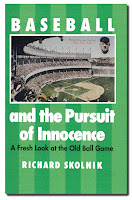 Errol Flynn had an unusual worry when he began reading the script for his 1952 swashbucker Against All Flags. It wasn't that the movie had an unrealistic historical setting or featured a clearly Anglo actress as the supposed Princess Patma, daughter of the Moghul Emperor of India. It wasn't that the ship movements depicted onscreen seemed very little affected by the supposed wind (a captain at one point orders his crew, anchored alongside a wharf, to "make ready to come about").
Errol Flynn had an unusual worry when he began reading the script for his 1952 swashbucker Against All Flags. It wasn't that the movie had an unrealistic historical setting or featured a clearly Anglo actress as the supposed Princess Patma, daughter of the Moghul Emperor of India. It wasn't that the ship movements depicted onscreen seemed very little affected by the supposed wind (a captain at one point orders his crew, anchored alongside a wharf, to "make ready to come about").
No, the problem was that he was supposed to have a sword fight with a woman and he felt it wouldn't fit with his traditional image as "the bravest guy onscreen." But the woman was Maureen O'Hara, who had by that point gone face-to-face with John Wayne onscreen and John Ford in real life and come up the winner. Director George Sherman had worked with O'Hara before and told Flynn that she could hold her own with swords, pistols or her fists and he'd better get in shape. She could, he did, and the result was 80 minutes of frothy fun on the seas near Madagascar in the year 1700.
Flynn is Brian Hawke, a man pretending to be a disgraced British East India Company officer embittered by ill treatment and seeking to join the Madagascar-based pirates sailing out of Diego Suarez. O'Hara is Prudence "Spitfire" Stevens, a woman captain who inherited her piratical position from her father. She's wary of Flynn but thinks she can use him to get out of Madagascar and enter legal society back in England. Anthony Quinn is Roc Brasiliano, another captain whose desire for Spitfire only magnifies his mistrust of Hawke. Alice Kelley is the aforementioned "Princess Patma."
Hawke tries to keep Patma safe while keeping Brasiliano at a distance and woo Stevens -- in addition to his original mission of locating and disabling the pirates' land-based fortifications so Royal Navy ships can destroy their base.
As mentioned above, it's a completely superficial romp that hits all the right notes -- Quinn glowers and schemes, Flynn swashes, buckles and swaggers about and O'Hara keeps her powder dry while making it clear she is a woman who decides things for herself. Flynn was 43 and his hard-living personal life was taking its toll, but he takes on everything his role demands, even down to a stunt that involved sliding down a sail to the deck with the aid of a rapier thrust through it. He did break an ankle at one point, in a more ordinary scene, which allowed Universal to recast the sets and shoot the B-picture Yankee Buccaneer while he recovered.
Against All Flags has a number of scenes that make a modern viewer uneasy -- the sale of Princess Patma's captured retinue as "brides" is treated with too many jokes in light of what it really represents and Alice Kelley is not in the slightest an Indian or a Moghul, although she and Mildred Natwick as her governess are funny in the right spots. Still, it was a movie made in 1952 and a lot of things about it -- from its special effects to its sensibilities -- are likely to make a modern audience wish them done better. But the solid performances from Flynn and Quinn, as well as the proto-lady warrior played by O'Hara, make it an interesting watch in the sea of similar features.






